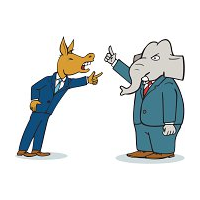Republican and Democratic Lawmakers Speak in Different Languages
 (graphic: Getty Images)
(graphic: Getty Images)
By Neil Irwin, New York Times
Republicans and Democrats aren’t just polarized on policy. To an unprecedented degree, they also speak different languages.
That is the conclusion of three economists who used computers to parse 136 years of transcripts of congressional speeches. They identified phrases used disproportionately by members of one party or the other, and tested the degree to which use of those “partisan phrases” accurately predicted the affiliation of a member of Congress — in other words, the degree to which Republicans and Democrats effectively have a language of their own. They found that language polarization skyrocketed in the mid-1990s, when Newt Gingrich and Bob Dole led Republican majorities in both chambers of Congress.
In the Congress from 1873 to 1874, armed with only the text of a one-minute speech on the floor of Congress, you would have had a 54 percent chance of guessing the speaker’s political party. By the session from 1989 to 1990, that had edged up only to 55 percent. In the 110th Congress, which ended in early 2009, that had risen to 83 percent, according to the new working paper by Matthew Gentzkow, Jesse M. Shapiro and Matt Taddy.
Using congressional vote records, political scientists have identified something of a “U” shape to U.S. political polarization: It was very high in the late 19th century and start of the 20th, before receding during the middle of the 20th century and surging higher in the last generation.
The language analysis, though, shows a different pattern — of stable but low-level polarization in the language members of Congress have used for more than a century, followed by a significant uptick since the 1990s. (The analysis ends at the start of 2009, but anyone who has lived through the Obama years would have a hard time imagining that the trend has reversed.)
“I expected that we might see this measure of difference in language track with other measures of how polarized Congress is, based on things like roll call votes,” said Gentzkow, a Stanford University economist. “Instead it looks like we’re seeing something totally new in the divergence in language.”
It has always been the case that Republicans and Democrats have used different phrases. In the 50th Congress, which began in 1887, if you heard someone talking about the fisheries treaty, it was probably a Republican; if he referred to high tariffs, it was probably a Democrat. (The researchers identified versions of those phrases as among the most partisan phrases of that session.)
But in recent years members of the two parties don’t merely emphasize different topics; they often use different language to refer to the same thing. Democrats refer to the “estate tax” and “tax breaks” while Republicans speak of the “death tax” and “tax relief.”
What has changed? One possibility is that it’s less about political polarization per se, and more about parties that are becoming more disciplined in the art of using language to their advantage.
In the mid-1990s, the consultant Frank Luntz used polling to help congressional Republicans use language to shift debates on key issues to their advantage — and in later years, for example, he pushed for saying “climate change” instead of “global warming.”
Perhaps what the researchers found is really evidence of a technological advance in political communication, of both parties doing more extensive research on messaging and exerting more partisan discipline in keeping all their members using the same language.
But even if it’s just communications strategy that’s driving the polarization of language, it still matters. In a world of complex challenges, it’s hard to come up with constructive solutions when the decision-makers can’t even agree on what words to use in talking about them.
- Top Stories
- Unusual News
- Where is the Money Going?
- Controversies
- U.S. and the World
- Appointments and Resignations
- Latest News
- Trump Renames National Football League National Trump League
- Trump to Stop Deportations If…
- Trump Denounces World Series
- What If China Invaded the United States?
- Donald Trump Has a Mental Health Problem and It Has a Name






Comments